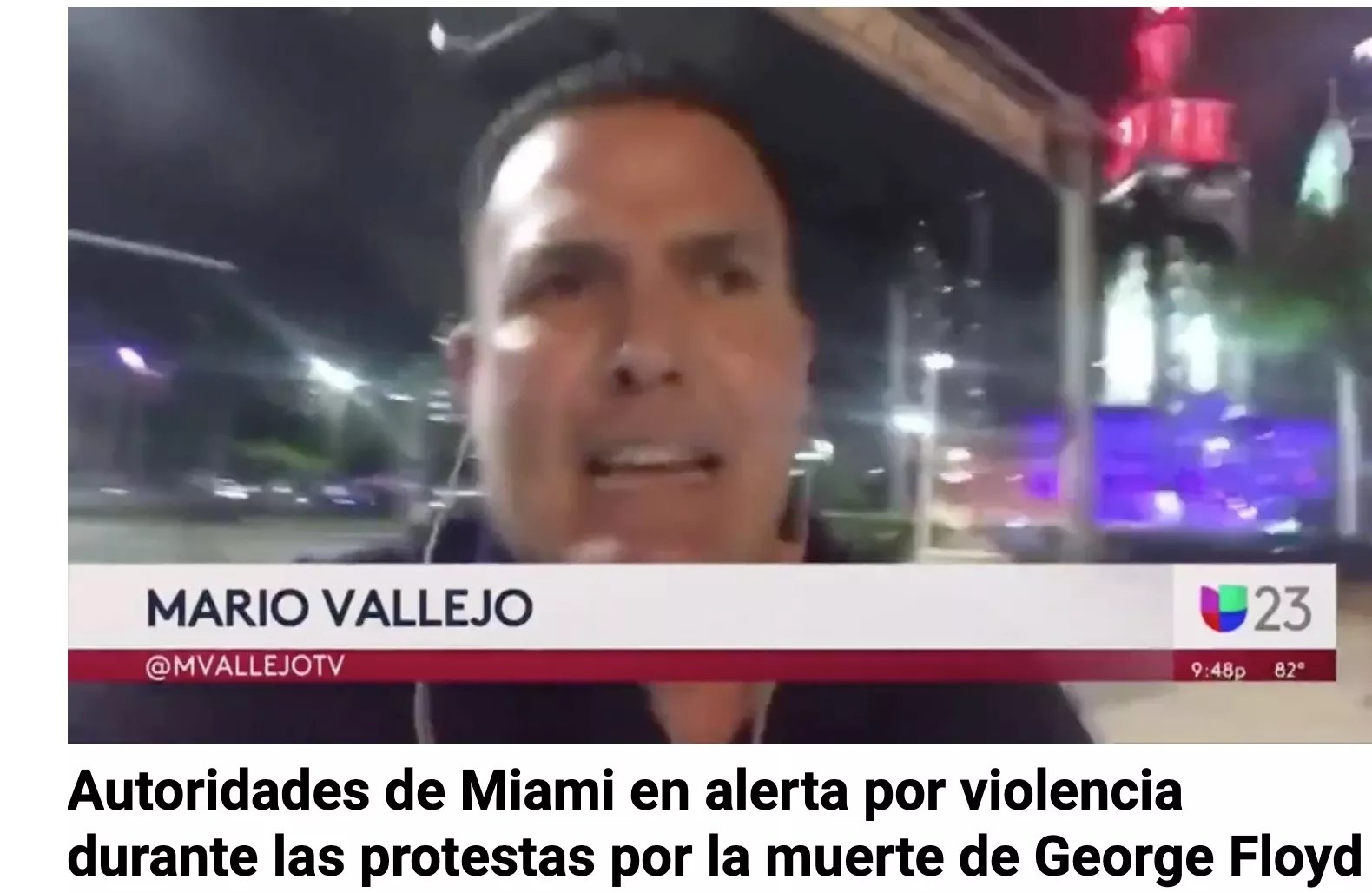
Screenshot via WLTV Univision 23

Audio By Carbonatix
A Miami newscaster’s incongruous remark during live coverage of a protest Saturday night hit a nerve in the local Puerto Rican community, at a time when racial tensions are running high on all fronts.
Puerto Ricans in Miami are speaking out against what they perceived as an unfair characterization made by Univision 23 reporter Mario Vallejo during a Spanish-language newscast from the George Floyd protest in downtown Miami. Vallejo made specific mention of the presence of Puerto Rican demonstrators at the protest – and then, in the next breath, said some of the protesters had begun looting shops at Bayside Marketplace nearby.
“Los afro-estadounidenses eran la minoría. Eran blancos, hispanos, de Puerto Rico,” Vallejo said. “Personas que no sobrepasaban los 35 años de edad. Salieron a protestar en varios sitios de Miami. En otros fueron mucho más pacíficas las protestas, sin embargo aquí en el centro de Miami lograron entrar a uno de los lugares icónicos y romper vidrieras. Me refiero a Bayfront Park un lugar que ha visitado todo aquel que llega al sur de la Florida.“
In English, that translates to: “African-Americans were in the minority. They were whites, Hispanics, from Puerto Rico. People no older than 35 years old. They went out to protest in various places in Miami. In other parts, the protest went much more peacefully, but here in the center of Miami they entered an iconic spot and broke store windows. I’m referring to Bayfront Park, where everyone who’s come to South Florida has visited.”
Puerto Rican groups in Miami were quick to denounce the comment, saying Vallejo’s statement was unfounded and inappropriate.
“That is the farthest thing from the truth,” Luis DeRosa, president of the South Florida Puerto Rican Chamber of Commerce, tells New Times. “People in [Puerto Rico] were very concerned and outraged that this journalist would say that. How was that determined?”
New Times reviewed Miami-Dade police records and found that of the 61 people arrested at the protests Saturday and Sunday, 21 were identified as Hispanic. Only one was explicitly identified as Puerto Rican.
On Facebook, Orlando resident Ilia Ivette Saunders posted a video of the news clip, captioning it in Spanish, “He said the only Hispanic bandits who went to protest were from Puerto Rico .. that is that in Miami there are no other Latinos, only Puerto Ricans.”
El lo dijo que los unicos hispanos bandoleros que fueron a Protectar son de Puerto Rico .. Osea que en miami no hay mas latinos solo Puertorriqueños ..
Posted by Ilia Ivette Saunders on Saturday, May 30, 2020
Maria Rodriguez, president of the Puerto Rican Leadership Council of South Florida, says Vallejo’s words were concerning on “a variety of levels,” adding that they diverted attention from the real reason for the protests.
“We felt like they were dismissive of the protests, and also they named Puerto Ricans as culprits in the looting. It’s pitting groups against each other, and we felt like it was irresponsible,” Rodriguez tells New Times.
Rodriguez says that because of the large Cuban population and political infrastructure in Miami, it has taken a long time for the Puerto Rican community to gain recognition and respect, and that a comment like Vallejo’s doesn’t help.
“In general, there is concern that the issues of Puerto Rico and Puerto Ricans aren’t covered, seen, or visible,” she says.
In a letter addressed to Univision 23 news director Samuel Belilty on Wednesday, the Leadership Council requested a meeting with the network’s executive team and a public on-air apology from Vallejo. Rodriguez says the general manager responded and is eager to meet – a gesture she takes as a good sign.
Reached by New Times, Univision spokesperson Jose Zamora explained that Vallejo had worked a 12-hour day, adding that his wording on the air was unfortunate.
“During breaking news coverage of the protests and ensuing violence in Miami this weekend, a Univision 23 reporter regrettably included reference to the participation of Puerto Ricans without context,” Zamora wrote in an email. “Our number one priority is to serve our community, and Mario Vallejo has done so for more than two decades by reporting accurately and respectfully about hundreds of topics relevant to all Miami and South Florida residents. We know we can do better and are committed to providing our audience full, accurate, and contextual reporting and commentary.”
DeRosa says that if Vallejo misspoke, he wants to hear that from him.
“I understand if he made a mistake. He was in a tense situation, worrying for his safety,” DeRosa says. “But he should apologize to us for misspeaking and explain. If he apologizes, we’ll tell our community and everything will be fine.”
Vallejo, who is 55, has worked for Univision as a general news reporter since 1998. According to his biography posted on the network’s website, he’s a specialist in the economy and politics of Cuba. He worked as a radio and TV reporter in Havana and as a reporter and producer in Chile. His work at Univision garnered him a regional Emmy Award for live reporting last year, and in 2006 the state chapter of the Associated Press recognized one of his stories with first prize in its investigative category.
Vallejo did not respond to a phone message, email, or Twitter direct message from New Times.
Maria Rodriguez says that beyond the reference to Puerto Ricans, Vallejo’s words are emblematic of a problem with news coverage that has focused on theft and property damage rather than the root cause of the protests.
“This is a tremendous opportunity to reveal racism and anti-blackness in our community, to look at and root out the problem,” she says. “The coverage is missing the opportunity to educate about this. We denounce them singling out Puerto Ricans.”